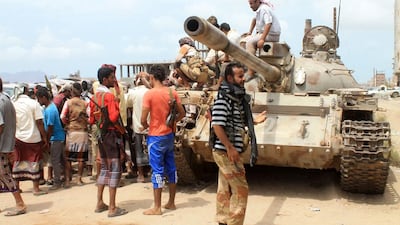Aden // A UN-chartered ship carrying desperately needed food supplies was forced to turn back from Aden after shelling by Houthi rebels, UN and local officials said.
The World Food Programme said on Monday that the MV Amsterdam was carrying enough grain and other food aid to sustain 60,000 people for a month but was unable to dock in the southern port city on Sunday and was diverted to the port of Hodeidah.
A provincial government official blamed the Houthi rebels, who control several neighbourhoods in Aden, for not allowing the ship to dock at the port, which is controlled by pro-government fighters.
“The Houthis fired shells at a ship chartered by the UN that was carrying 7,000 tonnes of food ... when it was within a nautical mile of Aden’s port,” the official said, adding that the vessel was not hit.
“The ship was forced to turn back and by night time it was about five to eight nautical miles from Aden,” he added.
The vessel had set off from Djibouti, which the UN uses as a hub for humanitarian aid bound for Yemen, he said.
A port official confirmed the incident and accused the rebels of “imposing a food blockade on areas of Aden under the control of the Popular Resistance Committees” comprised of fighters loyal to Yemen’s UN-backed president, Abdrabu Mansur Hadi.
UN officials will try to move the food to Aden by road if the security situation allows, said Abeer Etefa, a World Food Programme spokeswoman.
Aden has been one of the hardest hit areas in more than two months of conflict, including heavy street fighting, between pro-Hadi forces and the Iran-backed Houthis and their allies loyal to former president Ali Abdullah Saleh. Saudi Arabia has been leading an air campaign in support of the effort to restore Mr Hadi to power.
“It’s a humanitarian crisis,” Ms Etefa said. “The city has been cut off from supplies for a long time.”
She said Aden residents had no running water or electricity, and food shops were empty because supplies have not been getting into the city.
Aid groups have warned that the continuation of fighting could deepen the humanitarian crisis across Yemen.
Famine Early Warning Systems, a monitoring group, said on Monday that food price increases and lack of income in the war-torn country could soon push remote areas of Yemen into emergency.
“Due to the continued impact of ongoing shocks, food security outcomes are likely to deteriorate over the coming months,” the group said.
The Local Rescue Committee, a Yemeni humanitarian group in the southern province on Dhale near Aden, warned on Monday that residents in the area were suffering after being cut off from aid by the Houthis.
“We’re calling for emergency aid to alleviate the disastrous humanitarian situation for a quarter of a million people in the province,” an official said.
“Food, fuel and electricity are in short supply while sickness is spreading due to poor sanitation and stopped rubbish collection, meanwhile Dhale is cut off by Houthi militias from resupply in every direction.”
Meanwhile, political sources in Oman confirmed on Monday that diplomats in Yemen’s neutral neighbour were brokering talks in Muscat between Houthi and US officials aimed at finding a peaceful resolution to the conflict.
Independent politicians in Sanaa said the talks have succeeded in narrowing gaps between the Houthis and Mr Hadi’s exiled government to pave the way for eventual United Nations-backed negotiations in Geneva.
“There’s progress in the talks toward an agreement on a long truce and reviving political dialogue,” one politician said.
Oman is the only member of the six-country Gulf Cooperation Council not taking part in the Saudi-led coalition against the rebels in Yemen.
Coalition warplanes on Monday continued airstrikes on rebels positions across the country, targeting an arms depot on the Mount Noqum base on the outskirts of Sanaa.
Other airstrikes hit rebel positions in Amran, north of the capital, as well as arms depots in western Hodeidah province, residents said.
Coalition warplanes also struck rebel positions in the southern province of Dhale, military and tribal sources said.
In the rebels’ stronghold of Saada, overnight coalition raids struck rebel-held arms depots in the town of Marran, as well as rebel positions in Ibb, farther south in central Yemen, witnesses said.
The conflict has killed almost 2,000 people and wounded 8,000 since mid March, according to the World Health Organisation.
* Reuters and Agence France-Presse

